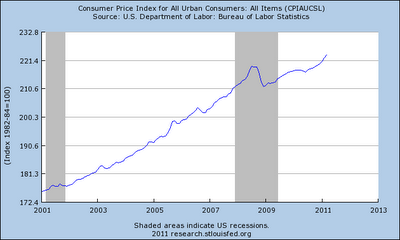Late update: If you happen to read this post, be sure to also read the comments. They are enlightening.
In thinking about the economics of slavery, I'm considering slavery and serfdom to be economic near-equivalents. Of course, I recognize that there are qualitative differences between chattel-slavery and serfdom:
- In slavery, the master owns the person of the slave; in serfdom the master owns the labor output of the serf, either as a stated labor quantity, a stated output quantity, or some combination.
- Serfs enjoy some measure of freedom, and can accumulate personal wealth, after the rents are paid; slaves do not and cannot. (The point, though is to keep rents so high that accumulation is prohibitively unlikely.)
- It might be easier to gradually and incrementally impose serfdom on an existing population. First generation slaves need to be captured, conquered, or in some other way removed from - and deprived of - their native state. Thus, serfdom is imposed on the indigenous population, slaves are more typically imported.
- The individual slave is a depreciating asset. But, as a population, slaves are self-renewing, since, unlike Shakers, they reproduce. Serfs are factor inputs rather than assets. (On the other hand, the master also owes the serf protection, and sustenance in times of famine. In that sense, the serf resembles an asset that requires maintenance.)
These are significant differences, to be sure, but mostly from a sociological or political perspective. In terms of the brute economics, they are somewhere between second order and trivial.
The necessary conditions for reducing a population to serfdom are as follows.
- A large wealth and power disparity between the haves and the have-nots.
- Perhaps more significantly, the ownership of virtually all assets by an elite class, with severely limited opportunities for the general population to own or accumulate assets.
- A poorly educated population with limited skill sets.
- Severely impaired individual mobility, due to an impossible debt and/or tax burden and legal restrictions.
- Government of the masters, by the masters, for the masters, with little or no sense of worth or justice for the serfs. This enforces and reinforces the previous point.
- A social and/or religious system that recognizes the inherent
meritocracy of the master class.
- A population that is scared or coerced into ceding their freedom to the masters in exchange for security.
- The political will to deprive people of their fundamental human dignity.
Via
Krugman, we find Delong's repost of a short
treatise on slavery and serfdom by Evrey Domar.
Domar points out additional requirements, and a mechanism for serfdom to develop.
-
Low population density: Labor scarcity favors slavery/serfdom, since the cost of freeman labor will be high. I'll admit I didn't get this until is was stated the other way around. Population growth favors freeman labor since
the competition for jobs drives wages down. (Note the implicit denial of the
"Lump of labor fallacy" canard.)
-
A large class of what Domar calls "servitors" who owe allegiance, taxes, and military support to a higher authority. They are the equivalent of medieval vassals of a liege lord, who extract from the local peasant population not only their own means of existence, but that of their liege, as well. This is the beginning of, and most literal sense of "
rent-seeking." The process is that, starting with a free population, by taxation or other forms of indebtedness, the freedom of the common people is eroded. Those whom Domar calls "servitors" I call leaches.
-
Explicit Government complicity in restricting mobility, via legal structures. Besides limiting the population's mobility in a gross sense, it also eliminates the possibility of competition among different servitors.
In this way, serfdom developed in depopulated* Western Europe
during or after the late Roman Empire, and in Eastern Europe many centuries later - in fact, long after serfdom has disappeared in the West. In each case, the critical enabling factor was low population density, resulting in a critical shortage of labor.
Basically, it comes down to an economic evaluation of costs and returns. But these are not easy to determine with any precision in the abstract, and probably not in the actual event, either, unless the increment is quite large. The slave, and even the serf, needs maintenance in a way that the free laborer does not. The serf can be compelled to work past his willingness in way that the free man cannot. On the other hand, the free man might have higher willingness and unit productivity. The wild card here is what the free man can demand as wages, and that depends on the competition for available jobs. The bottom line is that serfdom will dominate whenever the profit (revenues less costs) of keeping a serf is greater than that of hiring a free laborer.
Of course, all of this was long ago - pre-industrial revolution in fact, and centered on a low-technology agrarian system. What message does it have for us today?
Here, Krugman wonders** why, after the the plagues of the mid-14th century, serfdom wasn't reestablished in Western Europe, since the population was greatly depleted. Domar has no clear answer, and Delong won't hazard a guess. I will -- but it's only a guess. Perhaps society had moved on, and the culture was no longer accepting of serfdom as a social institution. Serfdom had faded away from lack of interest and due to population growth many decades before the plague epidemics occurred around 1350. There were sufficient numbers of artisans, craftsmen, guilds, merchants, and bankers, such that tying people back to the soil might not have been easy, or even desirable. The growth of towns might have played a part. Another social factor is that in late Eastern European serfdom, the servitor's status was determined by the number of serfs he controlled. I don't think that was ever the case in the West. Sometimes social factors trump economics.
Also, as Barbara Tuchman points out in
A Distant Mirror (Ch 11, frex.), though the population decreased due to the plague, total wealth in coins and material possessions did not, and they were largely in the hands of the elite. It could be that with this wealth maintained, the brute economic drive for serfdom was absent, or severely attenuated, despite the labor shortage.
Krugman also wonders:
"And an even bigger question: why hasn't indentured servitude made a comeback in the modern era? Yes, I know, human rights and all that - but if it was profitable to have indentured servants in the modern world, I'm sure that Richard Scaife's think tanks would have no trouble finding justifications, and assorted Christian groups would explain why it's God's will."
Well, that was in 2003, when Scaife was well known and the Koch brothers weren't. This statement also gets a lot of ridicule in comments at Delong's Domar post. But, there were certainly many Christian apologists for slavery, and you can see today that tea-baggers and the Christian Right do not exactly align themselves on the side of human rights vs the brute force of the elite.
So Krugman's question remains, hanging over us like the sword of Damocles. Here is the way I see it. First off, you need to be skeptical about translating a socio-economic phenomenon from a different place and time to the here-and-now. Our population is not sparse nor badly educated (yet), and we do not have a pre-industrial agrarian economy. But these differences effect the possibilities and modes of implementation. They don't effect the ongoing defects of human nature that Krugman obliquely alludes to. These are greed, ego, and the lust for power, and you can see them manifesting themselves right here in the U.S. today in the struggle between labor and the minions of the wealthy elite. When I think about serfdom, I also think about more modern analogs - sharecroppers, coal miners who owed their soul to the company sto'e, child laborers in early industrialized England, indentured servants, the exploitation of illegal immigrants, and the union busting practices that have been highly successful here since 1980.
In evaluating the conditions that favor and disfavor serfdom as such, something is missing from the analysis. That is that somewhere along whatever spectrum of conditions makes serfdom more or less economically favorable to the elite, there is a point (or region) of indifference. If working people are reduced to the point where the economics are no less favorable to the elite than serfdom, then actually going through the formality of making them serfs simply isn't worth the effort, and doesn't make any economic difference.
What do we have today?
- The largest wealth disparity since before the great depression - at every stratum of society, growing larger every day.
- An all out assault by the moneyed elite on the wealth and status of working people. Union busting is one of the tools.
- Deliberate undermining of public education.
- Segments of the population tied to the land by under-water mortgages or the inability to unload a property.
- Popular social movements with religious backing that favor the interests of the elite over the interests of the people.
- Constant fear-mongering as a pretext for inducing people to give up their basic rights.
- A moneyed elite that effectively owns government.
Krugman's apparent underlying assumption, which I share, is that - for the servitors at least, and possibly for the serfs as well - serfdom is a strategy of least resistance, and therefore the default social order,
whenever the conditions for it are right.
One of the things that can make conditions not right for serfdom is regulated entrepreneurial capitalism - inventiveness, innovation, industry, and real competition. Capitalism generates wealth, increases wages, opportunities and the standard of living, and reinforces concepts of freedom, liberty, and fair practices. Effective regulation assures that fair practices are maintained, keeps the playing field even, and increases the likelihood that reward is in some way proportional to a combination of skill and effort. Capitalism is expansionist by nature, serfdom is static.
Unfortunately, over time, capitalism transmogrified into Corporatism.
Corporatism, for all its acquisitiveness, is a very different phenomenon. Ownership is remote. Assets are used in large part for executive bonuses, dividends, and mergers and acquisitions. Though the track record of M&A in meeting stated goals is dismal, the real net effect is monopolization - corporatists hate competition. Corporatism seeks always and everywhere to decrease wages, and is utterly indifferent to the living standards, freedom, and opportunities of anyone outside the elite. Ethics and fairness are non-existent. Rewards are in proportion to rapacity. In other words, Corporatism is the new feudalism.
This is why I say that the goal of the Rethug party, as servitors to Scaife, the Koch's and their ilk, is to take us back to the 12th century. I've stated that trans-national corporations with no loyalty to anyone or anything constitute the real road to serfdom, in contradistinction to
what Hayek said. That is a bit inaccurate, though. Once wage scales are reduced to the par value of slave maintenance, it doesn't matter what the correct technical description of our condition is, and the elite won't care.
So - are we screwed, or what?!?
__________________________________________________
*
Antonine Plague of 165-180,
Cyprian Plague of 250-270,
Justinian Plague of 541-2
** The link to the Surowiecki article that Krugman mentions is broken.
It can be found here.
.




![[Most Recent Quotes from www.kitco.com]](http://www.kitconet.com/charts/metals/gold/tny_au_xx_usoz_4.gif)


